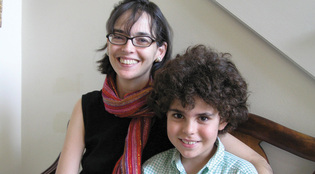 loading
loading
Arts & CultureThe mom who dared Joe Kolman"Worst mom" Lenore Skenazy ’81 and her son Izzy, whom she allowed to ride the Manhattan subway—alone. View full imageIf you Google the phrase "America's worst mom," the first hit is Lenore Skenazy ’81, who in 2008 let her nine-year-old son, Izzy, take the subway in Manhattan by himself. Skenazy wrote about the decision in her column for the New York Sun -- and then found herself on the Today show, parrying criticism from a clinical psychologist. After she let Izzy ride the Long Island Rail Road alone this year -- and a conductor who noticed him called the police -- she drew on the experiences for a book about her parenting philosophy. Emily Bazelon ’93, ’00JD, an editor at the web magazines Slate and DoubleX, interviewed Skenazy. Y: Why did you call your book Free-Range Kids? S: We are so consumed with making sure kids are safe that we are keeping them cooped up like chickens. We're preventing them from enjoying their lives. Of course, people ask me what a free-range kid tastes like. Y: In the book, when you describe letting your son ride the subway, you write, "I knew he was ready, so I let him go." What has the reaction been? S: Some people think I am insane. A few have even said they wish something bad had happened to Izzy, to teach me a lesson. But you know, putting my son on the subway was not really putting him in harm's way. In fact, kids are just as safe today as they were when I was growing up, when no one thought twice about letting them ride the bus alone, or walk themselves to school. Y: Did you also hear from readers who supported you? S: Yes, I set up a website, and people wrote in about falling off a bike as a kid, or getting lost, or even some guy pulling down his pants in front of them. They were hurt or shocked by the experience, but they went on with their lives. We need to hear more about that, about how you can be hurt but not stunted for life. We emphasize the worst possible scenarios, and we assume that every bad event inflicts a permanent psychic wound, as opposed to becoming part of the tapestry of our lives. Y: One reason parents are loath to take small risks with their children, I think, is that when a child gets hurt, the assumption is that the parents are to blame. S: Yes, yes, the guilt and the blame! The child of a friend of mine broke her arm on a swing. Other parents asked, "Why weren't you there?" In fact, my friend was pushing her daughter on the swing. Her child fell because sometimes bad things just happen, and it's no one's fault. But we don't believe in accidents anymore. Y: What kind of childhood did you have? S: A totally uninteresting one. I grew up in the suburb of Wilmette, Illinois. I was the kid who dutifully got off my bike at the corner to walk it across every street. Y: Based on the research you did for your book, do you think there are any risks now for children that differ from the risks when you were growing up? S: Hmm, let's see. We've learned that lead poisoning is a real danger. I think there's something to be said for cutting up grapes for babies, because of the choking hazard. I also agree with putting soft ground underneath jungle gyms. What else would we do with all those recycled Pepsi bottles? What I object to is taking away pleasures that pose a remote risk. Y: Are you raising Izzy and his brother Morry to be free-range kids? S: Somewhat free range. I'm actually an anxious parent. My sons saw a poster with Shrek on a skateboard once and said he was doing something dangerous because he wasn't wearing a helmet. But I believe in letting children do things -- going for a bike ride on their own, walking to school, cooking dinner -- that are a bit grown up. You can trust them.
The comment period has expired.
|
|